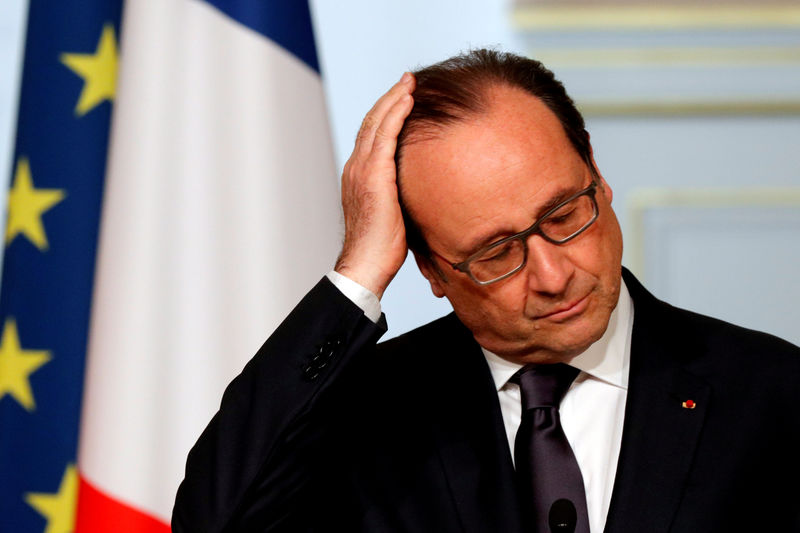By Ingrid Melander
PARIS (Reuters) - "Je ne t'aime plus, mon amour" -- "I don't love you any more, my love" -- was the wistful song of a love gone cold which greeted devotees of President Francois Hollande as they arrived at a rally for him last week.
An odd choice to fire up a political gathering, the track nonetheless captured the deeply unloved quality of Hollande's presidency just as he and his closet backers start to explore whether he has any real chance of a new term in 2017.
Just before he was elected in 2012, Hollande tweeted of the incumbent Nicolas Sarkozy, by then facing broad disenchantment: "Can you imagine five more years with the same?"
Now the same question applies to him. Since coming to power, Hollande has watched his ratings crumble to historic lows over a failure to restore the economy, doubts over his leadership and policy U-turns on security and other policy.
A poll published April 20 by the Viavoice agency found only one percent of voters think Hollande would make a "very good" president if given a second term next year; barely 10 percent judged that he could be "quite good".
A steep fall in membership of his Socialist party shows the disillusionment even among allies: the number of members has halved from 173,000 in the year he was elected to just 86,000.
While last week's gathering in a Paris university building was largely attended by grey-haired supporters, France's youth have little time for Hollande. Thousands have joined sometimes violent protests against a labour reform he says will encourage hiring but which they fear will make it easier to be sacked.
Polls show many left-wingers who backed him in 2012 won't this time: Without wooing them back he has no chance. To that end, he has promised more subsidies to students and a pay rise for teachers.
Yet many on the left see the labour reform as a betrayal, the last straw after his 2014 pro-business switch and an attempted security crackdown that was ultimately shelved.
"We've lost our credibility," said Benjamin Lucas, the head of the Socialist Party's MJS youth wing told Reuters.
As things stand, 12 months before the normally two-round presidential vote, several opinion polls over the past few weeks have shown he would not even secure enough support in the first round to make it to the run-off, whoever his opponents are.
But if his chances of success are slim, Hollande's backers have not given up hope just yet because of small but plausible signs that the euro zone's second largest economy is finally starting to pick up.
"Things are going better," Hollande said last month, a phrase widely picked up and analysed by local French media.
Sure enough data last week showed the economy grew 0.5 percent in the first quarter, more than expected thanks to the strongest increase in consumer spending since 2004 and a pick-up in business investment. And France saw in March the steepest drop in the number of jobless since economic boom days of 2000.
The problem is that the French are not convinced.
Household confidence stagnated in April at an eight-month low and expectations for standard of living over the next 12 months declined for the fourth month in a row.
And despite the drop last month, the number of people out of job is still over 600,000 higher than when Hollande -- who has promised not to stand again unless he can reverse the jobless trend -- was elected.
"Hollande can go on TV and say things are going better but people simply don't believe him," said Emmanuel Riviere of TNS Sofres pollsters.
CHALLENGE FROM INSIDE?
The government's response to the scepticism: "The President will repeat, repeat and repeat that message until it gets through," a close aide to Hollande said.
To do so, Hollande is making more visits throughout France and especially to firms that are signing contracts and hiring, such as state-owned naval contractor DCNS, which on Tuesday beat Japan and Germany to win a $40 billion submarines deal.
A strong communicator in private, he is also hosting even more of his regular evening meetings at the Elysee Palace with small groups of lawmakers, business leaders and others.
As incumbent, Hollande by French tradition has a right of first refusal on whether he will take his party's ticket into the May 2017 election. He is still not officially candidate and has said he will decide by the end of the year.
That gives him little time to convince Socialist voters and other left-wing parties he is still the best candidate for the Left, with just a couple of months before the summer lull of July and August and then a hectic second half of the year in which rival conservatives will also choose their candidate.
Together with the fact that opinion polls a year ahead of a French presidential election have often been wrong, Hollande's best hope may in fact lie with the centre-right's own internal divisions and the French public's mistrust of the far-right.
Were he to make it to the second round, Hollande would most likely face far-right party leader Marine Le Pen and polls show a majority of French do not want her in power, no matter how increasingly popular she is with some French.
Aides suggest Hollande will wait for the right-wing's late November primaries to be over before announcing whether he will run - front-runner Alain Juppe, a former prime minister, is much more of a danger to him than ex-president Sarkozy, still a polarising figure for many French.

A bigger challenge could yet come from the inside. Unless Hollande starts turning things round soon, more popular politicians in his camp, including rising-star Economy Minister Macron, might well throw their hat in the ring.